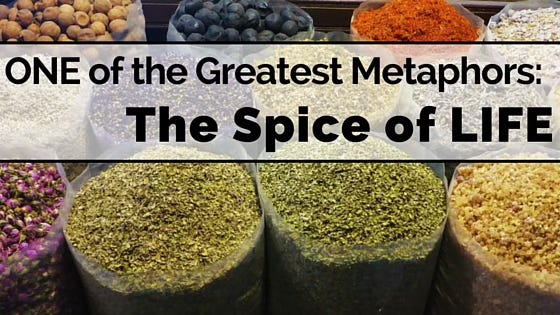This is the ninth in a series of the 12 greatest metaphors for life.
The breath of life: a person can live three minutes without air.
The shelter of life: in harsh climes a person can live 3 hours without shelter.
The water of life: a normal person can live three days without water.
The bread of life: the average person can live about three weeks without food.
The light of life: if the sun were to stop giving its light, global temperatures would drop, plants would die, trees would vanish, and all life would cease to exist.
The tree of life: without trees, we would have little fruit to provide our bodies with the antioxidants we so desperately need. In addition, trees provide beauty and shade, as well as leaves which provide healing substances.
The True Vine of life: up to this time, we have looked at the necessities of physical life. The vine of life represents something deeper: abundant life.
The oil of life: the olive tree was once a primary source of oil for food and light.
The spice of life: spice provides flavor for bland food, healing for sick bodies, and fragrance for perfumes.
The Spice of Life
Spices by nature add a special quality to whatever mundane thing they touch or mingle with. Can you imagine an apple streusel pie or pumpkin bread without cinnamon? Or chocolate chip cookies without a dash of vanilla? Or a mojito without a sprig of mint? Spice takes something that is already good and improves it, makes it better.
We recently talked about oil and how it represented abundant life and the joy of gladness in the Holy Spirit.
Spice and Oil
The Bible makes a strong connection between oil and spice. Exodus 25:6 speaks of spice used in anointing oil and incense. When the common oil was mixed with the spice, the oil took on the properties of the spice. The two could no longer be separated. Exodus chapter 30 explains that only the highest quality spices were to be used. And the finished product was "holy" or set apart to the Lord. God prescribed a specific formula that was not to be duplicated for common use. It was fragrant and lovely. Three pounds of this fragrant oil was used on the day of atonement.
Spice and Judgment
But the Old Testament also speaks of spice in judgment, particularly toward Jerusalem in her Babylonian captivity. Ezekiel 24:9-10 says:
Therefore, thus says the Lord GOD, “Woe to the bloody city! I also will make the pile great. “Heap on the wood, kindle the fire, Boil the flesh well And mix in the spices, And let the bones be burned.
One commentator says of this spice judgment: "I [God] will make the foe delight in its destruction as much as one delights in well-seasoned, savory meat."
Matthew Poole says the spicy judgment means "either to take away the noisome smell, or to express the pleasing savour of this justice to God, and men whom he appointed to this work."
Spice, Judgment, and the New Testament
This two-fold theme of the spice of life and the spice of death is carried into the New Testament.
Before Jesus, the spotless lamb, was judged on our behalf, Mary anointed his body with costly perfume (a sweet smelling oily spice). Jesus said she had done this to prepare for His burial. On the TRUE day of atonement, when Christ was crucified on a cross, He was offered bitter spices, but rejected them. Later, Joseph of Arimathea and Nicodemus prepared his body for burial with aloes and spices as was the custom. He was the fragrant offering to God on our behalf.
Now, as Christians, we can partake of the sweet smelling spice of His sacrifice. When we mingle with Christ, we become inseparable from His aroma. And we too become a fragrance to the world — either the sweet fragrance of life, or the smell of death and judgment to those who are perishing.
Paul writes in 2 Corinthians 2:15, "For we are a fragrance of Christ to God among those who are being saved and among those who are perishing; to the one an aroma from death to death, to the other an aroma from life to life."
Have you mingled with the spice of life in Christ? Are you sharing His aroma with those around you? His fragrance is sweet — regardless that those who love death find His fragrance a stench. His fragrance is set apart and "holy." It is not common. Only those who trust Him by faith will be rewarded with His sweetness.
"Oil and perfume make the heart glad..." Proverbs 27:9



